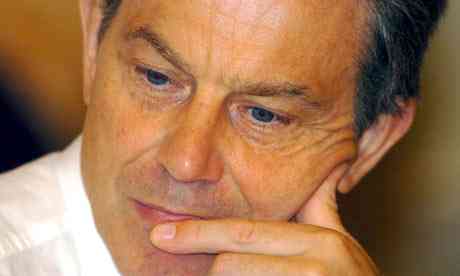
Tony Blair, graphic in 2004, when he was at his lowest. Photograph: Paul Grover / Rex Features
The End of the Party by Andrew Rawnsley 816pp, Viking, Signed copies £17.00 Buy The End of the Party at the Guardian bookshop
Buy The End of the Party at the Guardian bookshop Tony Blair descended in to such a low basin after the Iraq quarrel that he told Gordon Brown and John Prescott he would give up No 10 the following summer – usually to renege on the oath inside of months, a new book by the Observer"s Andrew Rawnsley reveals.
The former budding minister"s earthy and mental decrease was so surpassing that he confided to friends that he "spaced out" multiform times during Prime Minister"s Questions and mostly woke up in the center of the night with persperate trickling down the behind of his neck.
Rawnsley"s bomb comment is in The End of the Party, that is published on Monday , extracts from that crop up in tomorrow"s Observer. It lays bare, for the initial time, how Blair was condemned and worried by the deepening disharmony and carnage in Iraq at the same time as being ragged down by the consistent mental crusade being waged by Brown, his next-door next door neighbour in Downing Street, who was increasingly unfortunate to take his job.
While Blair"s present for display helped him censor his basin from the open and infancy of his staff, his in isolation misunderstanding was so serious that he motionless there was zero for it but to palm over to Brown mid by his secondterm.
Rawnsley is the initial publisher to item how Blair, in those darkest days, done transparent at a cooking with both Brown and Prescott in Nov 2003, and after in a write call to Prescott in open 2004, that he would step down.
Sally Morgan, Blair"s executive of supervision relations, told Rawnsley: "Iraq was a swamp swallowing him up. The atrocities. Those distressing photos [of Abu Ghraib]. And he proposed losing people who had upheld him throughout. He was stranded in this prolonged dim hovel and could see no approach out of it."
The book relates how Blair"s special attach� in Iraq, the former UN ambassador, Sir Jeremy Greenstock, came to No10 at the finish of his use in Baghdad to short the budding minister. Greenstock knew that his "very murky assessment" had done him rarely but a crony in the building. Some at No 10 attempted to keep him away, fearing the stroke on Blair"s collapsing morale. In Blair"s basement Greenstock warned him that the incident looked "unbelievably bad" and would get some-more unfortunate in the months to come. "What can we do?" pleaded Blair. "We have told them [the Americans] again and again what we think is necessary. If it doesn"t happen, what can we do?" Greenstock was left with the picture of the budding apportion "tearing his hair" over Iraq and "throwing his hands in the air".
Rawnsley afterwards charts how Blair – urged by his wife, Cherie, and closest domestic friends to lift behind from the margin and repudiate Brown his possibility – progressively recovered his self-belief and motionless to quarrel on. The volte-face caused Brown"s disappointment to spin to rage.
On one arise Brown went turn to No 10 to get an answer. One of Blair"s middle round who witnessed this says: "Gordon was only losing it. He was working identical to a martial teenager. Just station in the bureau shouting: "When are you going to fucking go?" "
Blair"s dim duration via late 2003 and early 2004 was compounded by his heart censure and stress that his immature young kids were pang at propagandize since of the but a crony quarrel their father had championed in Iraq. His crony and cupboard co-worker Tessa Jowell says: "He was really low, he was really waste and he was really tired."
In Nov 2003, Prescott, who was behaving as "referee" in between the budding apportion and chancellor, hosted a cooking to plead their differences and residence the period question. Next sunrise a visibly vehement Brown told his key aides, Ed Miliband, Ed Balls, Spencer Livermore and Sue Nye, that Blair had positive him he was going in the summer. The 4 were sceptical, carrying listened about identical promises from Blair before. But by the open Blair was to write Prescott and discuss it him he had staid on Jun as his depart date.
Behind the scenes, Blair"s allies feared he was wobbling and were hatching a plan to progress his morale. Jowell went to his investigate and told him: "You"re going to get by this." Blair replied but conviction: "I"m fine, darling. Don"t be concerned about me. I"m fine." Blair"s friends beheld that women were improved at bolstering him than men.
Peter Mandelson told him: "Come on. Buck up. Buck up. Think of what you"ve got to achieve. You"re the most appropriate statesman in this nation by a mile."
After the Jun internal elections of 2004, that were bad for Labour but not disastrous, Blair"s liking for the pursuit returned and he motionless to stay to quarrel the 2005 election, that Labour won, though with a almost marked down majority.
In autumn 2004, Blair spoken he would quarrel the choosing but not lead Labour in to a fourth one. But the matter led to relentless conjecture about his depart date. Rawnsley reveals how, in the summer of 2006, Prescott was so undone with Blair"s warding off to name a handover date that he in jeopardy to renounce as emissary budding apportion unless he did so.
No comments:
Post a Comment